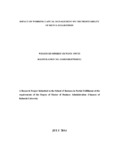IMPACT OF WORKING CAPITAL MANAGEMENT ON THE PROFITABILITY OF KENYA SUGAR FIRMS
Abstract
Working capital management is a key issue in financial decision making since its overall
goal is to ensure that a firm is able to continue its operations and that it has sufficient
ability to satisfy both maturing short-term debt and upcoming operational expenses which
directly affects the liquidity and eventual profitability of the company. Companies can thus
use working capital management as an approach to influence their profitability. This
project studied the impact of working capital management on the profitability of sugar
firms in Kenya for a period of 10 years; financial years 2003-2012. Using quantitative
method approach and based on panel data set, the study targeted sample of eleven (11)
Kenya sugar firms and obtained data from seven (7) firms representing 63.6% response.
The different variables of working capital management studied include, the accounts
collection period, inventory turnover in days, accounts payment period, cash conversion
cycle and current ratio, debt ratio, size of the firm and financial assets to total assets ratio
on the net operating profitability of these firms. Secondary data from the sampled sugar
firms was reviewed and analyzed to show the relationship between the variables. Data was
then analyzed on quantitative basis using Pearson’s correlation and OLS regression
analysis. The results showed that there is statistical significant relationship between
profitability and working capital management implying that firm managers can create
profits or value for their companies and share holders by correctly handling the cash
conversion cycle and by keeping each different component of working capital to a possible
optimum level. The results of this study generally support most of the findings of previous
studies done on this subject matter. Additional modeling by ownership shows that privately
owned sugar firms had a much stronger linear relationship between profitability and
working capital management. Finally, the study identified the need for further research on
the relationship between working capital management and profitability of Kenya sugar
firms through to the earlier periods before liberalization when these firms had little
competition and were subjected to massive political patronage with little accountability.

